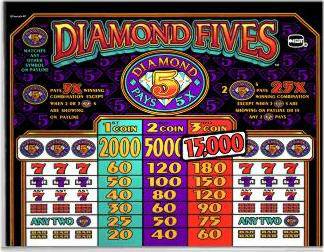
When you press the button (or pull the handle — same switch) to spin the reels (mechanical or digital) or draw cards, you’re causing a software random number generator to spit out a number. Generating hundreds of thousands of numbers a second, there’s no way to influence it. This number is an index into a lookup table which lists which symbols the machine is to display on a reel machine. The rotating reels slowly stopping are all for show. On a poker machine, the table lists which combination of cards to display. Yes, the table is big enough to contain every combination of 5 out of 52 cards – actually 10 cards as the 5 in the draw are also selected OR pressing the button generates 10 numbers which pick 10 cards out of 52. (More on poker machine operation in a later lesson) Wiping the screen with your hand, chanting and all the other things players do only make them feel like they’re influencing the odds. Truth is a fraction of a second after they pressed the button, their fate was decided by electronics.

The lookup table actually has many extra rows into which duplicates of certain combinations are stored. For example, if orange space space (yes, spaces on a reel are positions, too) is a losing combination, it might be in the table 30 times. A small winning combination (cherry anything anything) might be in 10 times while the top prize is only in once. All this increases the overall number of combinations decreasing the odds of winning.
If each reel on a 3 reel slot has 22 spots it can stop on (11 symbols + 11 blanks), the total number of combinations is 22 x 22 x 22 = 10,648 combinations. That means each play has a 1 in 10,648 chance of hitting any combination. With ‘virtual’ spots (the duplicates), this can be multiplied many times. Progressive slots (multiple machine’s whose top prize is pooled) use this concept to create millions of combinations making it harder to win the big money prize.
So if all slot machines use random number generators to pick what symbols or cards are displayed, how come different machines have different odds? It’s all in the paytable printed somewhere on the machine. Lots of math went into developing the paytable to determine how often someone wins and how much. And then there’s the science of perception, marketing and other factors that go into it.
That paytable is encoded in an EPROM chip on the main logic board. To change the odds of the machine (called the ‘par’), the casino has to change the EPROM to one using a different paytable, plus change the printed paytable on the machine. The par determines what percentage is kept by the casino (called the ‘hold’ or theoretical win) and what is paid back to the customers in the form of winnings. A machine with a par of 98 will pay back 98% of what it takes in. That’s what you see when casinos advertise 98% payback. Sort of.
Two reasons why that’s deceiving. First, par is figured on 100,000 plays with max coin in. In other words, if a machine accepts a maximum of three coins, over 100,000 plays with three coins always inserted, the average payback over all those plays will be 98% of what was put in. But probability being what it is, you could sit down at a machine and lose 1000 times in a row and still the machine could have a 98% payback over the 100,000 plays.
Second, casinos stretch their advertising. Most machines on the floor might have paybacks of 80-95% (the minimum is set by state or jurisdiction) while one bank or several slots sprinkled around or even just one machine might have a 98% par. Read the fine print.
So how can you know which machine to play to maximize your chances of winning? You can’t tell by looking at it what the par is. But knowing a few simple facts about paytables and a few design elements will help you narrow down to which are ‘better’ than others. Next time…















Do the indians know about this???
Thanks Dave – I’m enjoying these.
I played seriously once, and won.
Stalked an old 70+ lady for a hour, feeding the same 3 machines, went through two of those big plastic gallon jugs.
When she left, probably to get more, I got a full payout on the second pull.
Paid for the evening, the supper, babysitter, parking…
My Brother-in-law works for Speilo – a company that manufacturers Video Lottery Terminals and I (and many others) have asked him if there is a secret to making money on them. His response: Don’t Play.
His response: Don’t Play.
My advice to friends is to give me their money, and I guarantee a 50% return…much better than any of the games.
#5 – Is that 50% over 100,000 plays?
You two-armed bandit you!
Keep ’em coming Dave!
Iv seen hands that looked like,
IF you played them right, that ANY hand would win..
Between the hand delt, and those cards drawn… There was a combo that would have won.
Is this just a way to make you play MORE, Random, or can a game be made, that IF’ you pick correctly, you can win every/most hands.
this is interesting — uncle thanks david